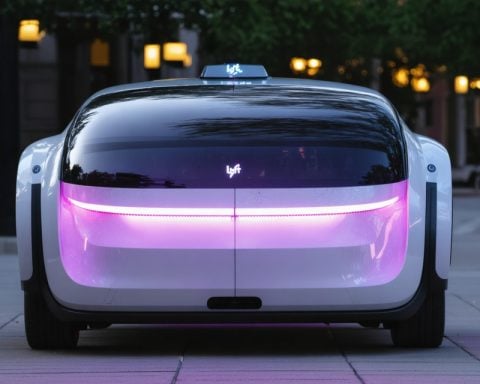- BMW leads the German electric vehicle market as the top premium brand in early 2025.
- In January, BMW’s battery electric vehicle sales reached 2,795 units, up from 13.94% to 17.22% of total sales.
- Audi and Mercedes lagged behind with 1,922 and 2,211 BEVs sold, respectively.
- Tesla’s sales dramatically dropped by 60%, with only 1,277 registered vehicles.
- BMW’s diverse lineup includes models like the iX2, iX3, and i7, thanks to a versatile modular platform.
- The upcoming Neue Klasse lineup is expected to introduce advanced technology and further enhance BMW’s market position.
In an electrifying start to 2025, BMW has solidified its dominance in the German electric vehicle market as the leading premium brand. Surpassing iconic rivals like Audi and Mercedes, and even displacing Tesla in its home turf, BMW registered an impressive 2,795 battery electric vehicles (BEVs) in January, rising to 17.22% of its total sales—a notable leap from 13.94% last year.
This surge signifies not just a step forward for BMW but a remarkable turnaround. While Audi and Mercedes posted modest sales of 1,922 and 2,211 BEVs respectively, they couldn’t keep pace with BMW’s overwhelming presence. Tesla, once the frontrunner, suffered a 60% decline, with only 1,277 registrations, marking a pivotal shift in market dynamics.
BMW’s triumph is fueled by its versatile lineup, accommodating various preferences—from compact SUVs to luxurious sedans. This flexibility, born from a modular platform, allows the brand to offer a range of drivetrains that competitors simply can’t match. Enthusiastic consumers can choose from models like the iX2, iX3, and i7, ensuring BMW stays ahead in the game.
With the Neue Klasse lineup nearing launch, which promises groundbreaking technology, BMW’s electric ambitions show no signs of slowing. This victory not only highlights the power of diverse offerings but also emphasizes a clear takeaway: In an ever-evolving EV landscape, adaptability and choice reign supreme!
BMW’s Electric Evolution: A Surprising Shift in the EV Market
BMW’s Dominance in the Electric Vehicle Sector
In 2025, BMW has proven its prominence in the German electric vehicle (EV) market, claiming the title of the leading premium brand. Surpassing prestigious competitors such as Audi, Mercedes, and even Tesla, BMW’s performance is a significant indicator of changing dynamics in this competitive landscape.
Key Highlights
– Sales Surge: BMW registered 2,795 battery electric vehicles (BEVs) sold in January 2025, capturing 17.22% of its total sales, a noticeable increase from 13.94% in the previous year.
– Competitor Performance: Audi and Mercedes sold 1,922 and 2,211 BEVs respectively, while Tesla experienced a dramatic 60% decline, registering only 1,277 units.
– Diverse Lineup: BMW’s ability to offer a flexible range of models—from compact SUVs like the iX2 to luxury sedans like the i7—plays a crucial role in its sales success.
– Innovative Platform: The company’s modular platform design facilitates a diverse array of drivetrains and increases its competitive edge in the EV market.
Current Trends and Innovations in the EV Market
– Neue Klasse Launch: BMW is set to enhance its EV offerings with the upcoming Neue Klasse lineup, which promises to introduce cutting-edge technology and design, targeting both performance and sustainability.
– Sustainability Initiatives: BMW has intensified efforts to reduce emissions throughout its manufacturing processes and supply chains, aligning with global trends toward sustainability in the automotive industry.
Frequently Asked Questions
1. What factors contributed to BMW’s rise in the EV market?
– BMW’s rise can be attributed to its innovative modular platform, which allows for versatile designs and numerous models suited for varying consumer preferences, along with strategic marketing and a focus on sustainability.
2. How does BMW’s upcoming Neue Klasse lineup impact its future in the EV market?
– The Neue Klasse lineup is expected to leverage advanced technology and superior battery performance, potentially enhancing BMW’s competitive stance and attracting a new segment of environmentally-conscious consumers.
3. What might the future hold for BMW in relation to its competitors in the EV sector?
– As the market continues to evolve, BMW will likely focus on expanding its product offerings, enhancing battery technology, and emphasizing sustainability, which could further solidify its position against rivals like Audi, Mercedes, and Tesla.
Insights and Predictions
– Market Forecast: Analysts predict that BMW’s continued investment in innovative technologies and diverse EV offerings will help sustain its market share, especially as more consumers shift toward electric vehicles.
– Consumer Preferences: A growing trend towards customization and personalization may further drive demand for BMW’s varied electric offerings, allowing the company to cater to unique consumer needs.
For more information on BMW and its automotive innovations, visit BMW Official Site.














